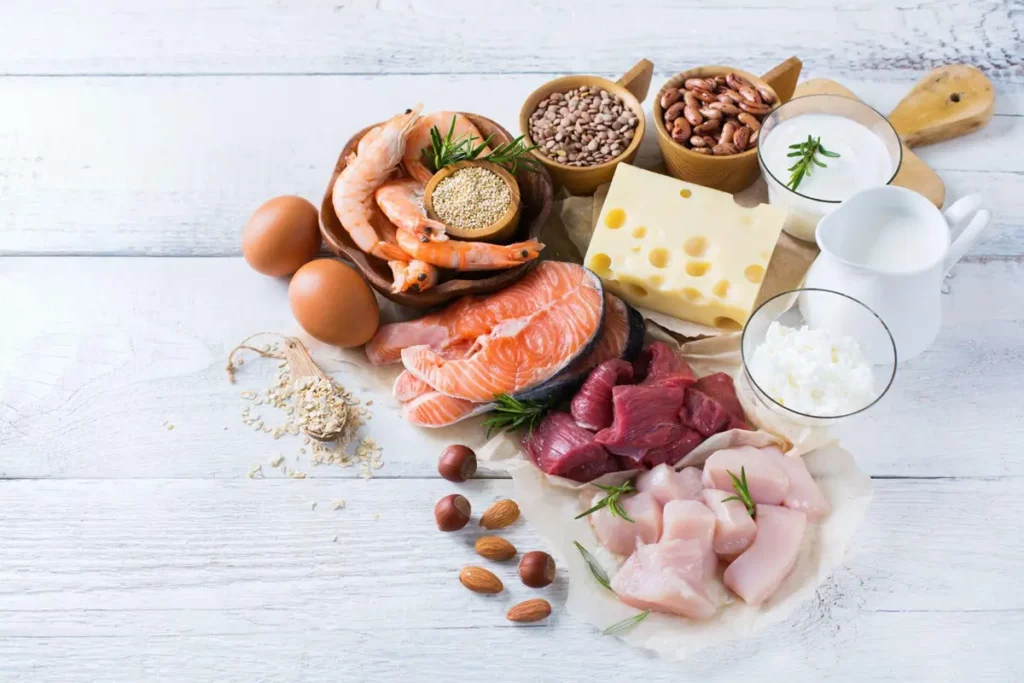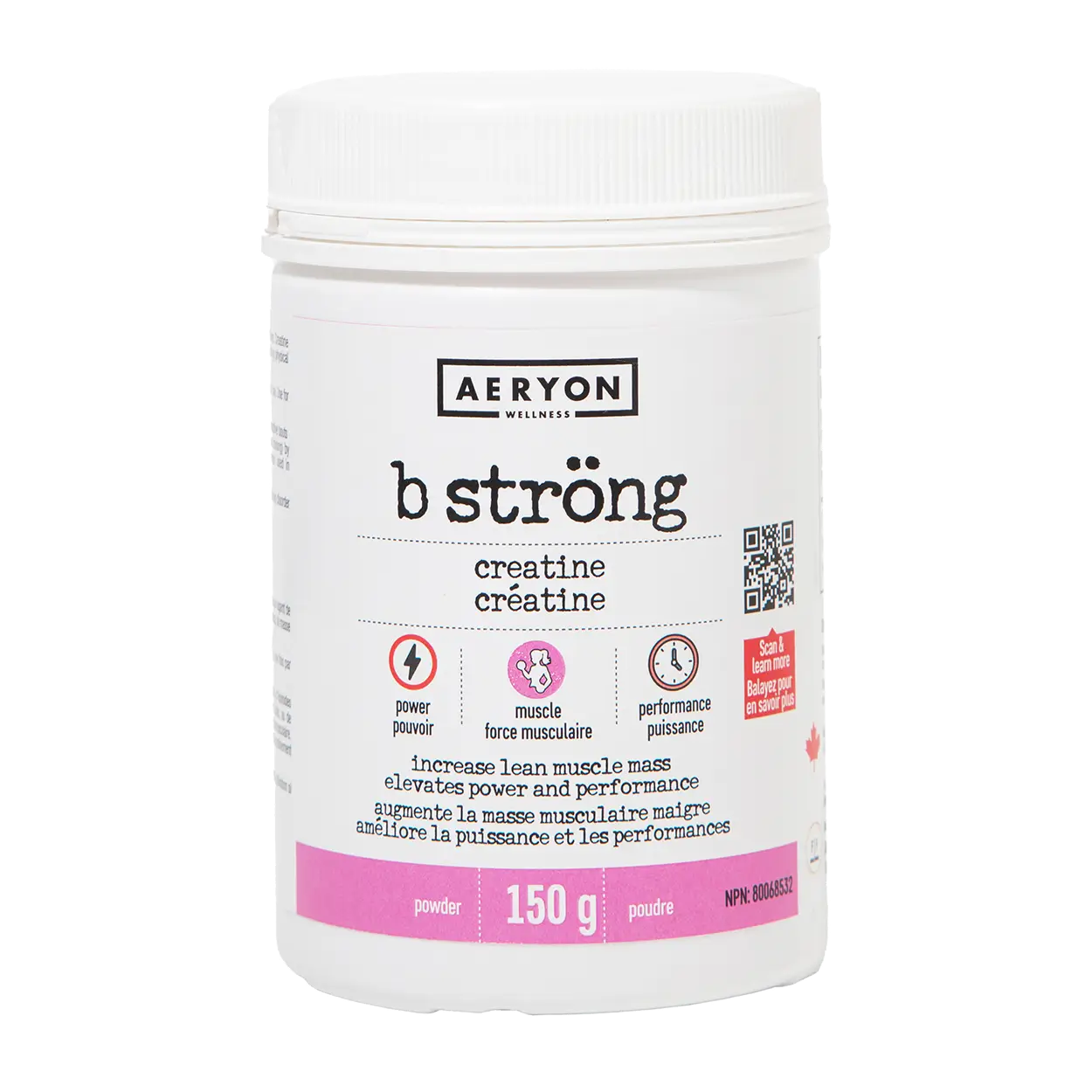The Importance of Muscle Health as We Age
As we age, preserving muscle mass becomes increasingly important for maintaining mobility, strength, and overall health. After the age of 30, adults can lose 3-5% of muscle mass each decade, with this decline accelerating after 60. Muscle isn’t just about physical strength; it also plays a critical role in metabolic function, bone health, and even mental well-being.
Maintaining muscle mass can help prevent frailty, reduce the risk of falls, and improve quality of life in later years. Incorporating resistance training and a balanced diet is essential, but supplementation with B Ströng, a pure creatine monohydrate, can be a powerful tool in this process—especially for women going through menopause and perimenopause.

B Ströng Gym Workout
Day 1: Upper Body Strength
Warm-up:
- 15 minutes walking on an incline at Zone 2 (weighted vest optional)
Workout (as heavy as possible):
- Chest Press Machine: 4 sets of 5-6 reps
- Seated Row Machine: 4 sets of 5-6 reps
- Overhead Shoulder Press (machine or free weights): 4 sets of 5-6 reps
- Bicep Curl Machine: 4 sets of 5-6 reps
- Tricep Pushdown (cable machine): 4 sets of 5-6 reps
- Plank Hold: 3 sets of 30-45 seconds
Day 2: Lower Body Strength
Warm-up:
- 15 minutes walking on an incline at Zone 2 (weighted vest optional)
Workout (as heavy as possible):
- Leg Press Machine: 4 sets of 5-6 reps
- Romanian Deadlifts (dumbbells or barbell): 4 sets of 5-6 reps
- Leg Curl Machine: 4 sets of 5-6 reps
- Leg Extension Machine: 4 sets of 5-6 reps
- Calf Raise Machine: 4 sets of 5-6 reps
Day 3: Jump Training + Cardio
Workout:
- Box Jumps: 3 sets of 8-10 reps
- Jump Squats: 3 sets of 10-12 reps
- Jump Lunges: 3 sets of 8-10 reps per leg
- Sprints: 8-10 rounds of 30-second sprints, 1-minute walking/jogging recovery between rounds
Cool down:
- 15 minutes walking on an incline at Zone 2 (weighted vest optional)
Day 4: Full Body Strength
Warm-up:
- 15 minutes walking on an incline at Zone 2 (weighted vest optional)
Workout (as heavy as possible):
- Goblet Squats: 4 sets of 5-6 reps
- Push Press (dumbbells or barbell): 4 sets of 5-6 reps
- Lat Pulldown Machine: 4 sets of 5-6 reps
- Seated Row Machine: 4 sets of 5-6 reps
- Plank to Toe Taps: 3 sets of 20 reps
Day 5: Sprints
Warm-up:
- 15 minutes walking on an incline at Zone 2 (weighted vest optional)
Workout:
- Sprint Intervals: 8-10 rounds of 30-second sprints followed by 1-minute rest (walking or light jog between sprints). Focus on maximum effort during the sprint intervals.
Day 6: Lower Body Strength
Warm-up:
- 15 minutes walking on an incline at Zone 2 (weighted vest optional)
Workout (as heavy as possible):
- Leg Press Machine: 4 sets of 5-6 reps
- Bulgarian Split Squats (using machine or bodyweight): 4 sets of 5-6 reps per leg
- Glute Bridges (with barbell or machine): 4 sets of 5-6 reps
- Romanian Deadlifts (machine or free weights): 4 sets of 5-6 reps
- Plank to Toe Taps: 3 sets of 20 reps
Day 7: Active Recovery
Activity Options:
- 30-60 minutes of light yoga, stretching, or foam rolling
- Easy walking or swimming for 30-45 minutes
How Menopause and Perimenopause Impact Muscle and Bone Health
During perimenopause and menopause, hormonal changes significantly affect the body, including muscle mass and strength. Lower estrogen levels, in particular, accelerate muscle loss and can also impact bone density, leading to conditions like osteoporosis.
This natural decline in estrogen can also affect the body’s ability to recover from exercise, making it harder to maintain the muscle built through resistance training. As a result, many women experience a loss of strength, mobility, and energy during this phase of life.
However, studies show that supplementing with creatine, alongside strength training, can help counteract these effects by promoting muscle regeneration and increasing energy production in the muscles. For women navigating these changes, B Ströng can provide support by enhancing muscle recovery and helping to maintain lean muscle mass.
Creatine’s Role in Supporting Women Through Menopause
Creatine, a naturally occurring compound, plays a key role in the production of ATP, the body’s primary energy source for muscle contractions. This makes creatine especially beneficial during high-intensity workouts and resistance training.
For women in menopause and perimenopause, creatine supplementation offers several key benefits:
- Preserves Lean Muscle Mass: Creatine can help slow down the muscle loss that occurs as estrogen levels decline, allowing women to maintain strength and physical performance.
- Supports Bone Health: Research indicates that creatine can reduce bone resorption (the breakdown of bone tissue) and support bone formation, helping to prevent osteoporosis and other bone-related issues common in menopause.
- Enhances Energy Levels: Many women experience fatigue during menopause, and creatine can boost muscle energy stores, improving workout performance and daily stamina.

Additional Benefits of Creatine
Beyond its well-known role in supporting muscle growth and recovery, creatine offers a range of health benefits that extend far beyond the gym. Research has shown that creatine supplementation may have positive effects on various health conditions, making it an essential tool for maintaining overall well-being, particularly as we age.
- Managing Type 2 Diabetes: Creatine may assist in managing type 2 diabetes, a condition that affects the way the body utilizes insulin, particularly in middle-aged and older adults. Studies suggest that creatine can improve glucose tolerance and enhance insulin sensitivity, helping to regulate blood sugar levels. This can be especially beneficial for those looking to manage or prevent diabetes through lifestyle changes and supplementation.
- Supporting Neurological Health: Emerging research highlights creatine’s potential role in supporting neurological health. Creatine may benefit individuals with certain neurological diseases such as Parkinson’s and Alzheimer’s by reducing oxidative stress and protecting brain cells from damage. While further studies are needed, initial findings suggest that creatine could help slow the progression of these disorders, though its effectiveness during advanced stages remains uncertain.
- Reducing Inflammation and Oxidative Stress: Creatine’s anti-inflammatory properties make it a valuable supplement for reducing inflammation and oxidative stress, which are both linked to various age-related health issues. By combating these effects, creatine helps protect cells from damage, supporting overall health and longevity.
- Promoting Bone Health: Creatine has been shown to reduce serum markers of bone resorption (the breakdown of bone tissue), which is critical for preventing bone loss as we age. It also promotes bone formation, helping to maintain bone density and reduce the risk of osteoporosis, particularly in older adults and postmenopausal women.
Creatine is a powerful supplement that offers numerous benefits, particularly for individuals engaged in physical activities like sports or strength training. It boosts energy production in muscles, allowing for improved performance during high-intensity, short-duration exercises such as sprinting or weightlifting. Creatine also aids in faster recovery between workouts, enabling athletes to train harder and more frequently. Additionally, it promotes muscle growth by increasing water retention in muscle cells, which enhances strength and muscle mass gains over time. Overall, creatine is a safe and effective supplement for enhancing both athletic performance and overall well-being.
Getting Creatine from Your Diet
You can obtain creatine naturally through certain foods, primarily animal products, though the amount of creatine from food alone is typically lower than from supplements. Incorporating these foods into your diet may help support muscle strength and overall health:
- Red Meat (beef, lamb, pork): Red meat is one of the richest sources of creatine, providing about 1-2 grams per pound (raw). Including beef or lamb in your diet can help increase your creatine intake.
- Fish (salmon, tuna, cod, herring): Fatty fish like salmon and herring are also great sources of creatine, with similar levels to red meat. Eating fish not only boosts creatine but also provides heart-healthy omega-3 fatty acids.
- Poultry (chicken, turkey): While poultry contains less creatine than red meat or fish, it still contributes to your overall intake. Including chicken or turkey in your meals adds a moderate amount of creatine.
- Eggs: Eggs are another animal-based source of creatine, albeit in smaller amounts. They are also rich in high-quality protein and other essential nutrients.
- Dairy Products (milk, cheese): Dairy products provide small amounts of creatine, along with valuable protein and calcium, supporting muscle and bone health.

While vegan foods do not contain creatine, some can support the body’s natural creatine production by providing essential nutrients and amino acids. Here’s how the following vegan-friendly foods contribute:
Beans and Legumes: Rich in amino acids like arginine, glycine and methionine, which are precursors to creatine production. Foods like chickpeas, lentils, and black beans are excellent choices.
- Soy Products: Tofu, tempeh, and edamame are rich in protein and amino acids that can contribute to creatine production and overall muscle health.
- Pumpkin Seeds: Rich in arginine, an amino acid crucial for creatine synthesis, as well as other essential nutrients like magnesium and zinc that support overall muscle function and health.
- Sesame Seeds: Provide a good source of arginine and other amino acids like glycine necessary for creatine production, along with healthy fats, calcium, and protein.
- Walnuts: Rich in arginine and omega-3 fatty acids, which support muscle recovery and overall health. They also provide beneficial antioxidants.
- Almonds: Contain arginine and other amino acids that support the body’s creatine production. Almonds are also a great source of healthy fats, and vitamin E.
Although dietary sources of creatine are beneficial, achieving optimal levels for enhanced performance and other health benefits often requires supplementation, especially for those with higher demands or specific health goals.
What’s included inside B Ströng
Creatine Monohydrate
Creatine monohydrate is the purest and most studied form of creatine, known for its ability to enhance strength, power, and muscle performance during physical activity. It works by increasing the body’s stores of phosphocreatine, which helps produce more ATP—the energy currency of your cells—during intense exercise. Supplementing with creatine monohydrate not only supports muscle growth and recovery but also promotes improved overall athletic performance and endurance. Its effectiveness and safety have been widely validated, making it a trusted choice for both athletes and those looking to improve their physical health.
B Ströng is a premium supplement formulated with 100% pure creatine monohydrate, free from any fillers, designed to enhance your physical performance. Known for its ability to boost strength, power, and lean muscle mass, creatine supports improved performance in high-intensity activities such as sprints, resistance training, and explosive movements. With a recommended daily dose of one 5g scoop, B Ströng helps elevate your intramuscular creatine levels, ensuring sustained energy and enhanced endurance during repetitive bouts of intense physical activity. For optimal results, it’s recommended to use B Ströng for a minimum of 4 weeks.
Please note: When adding creatine supplementation and resistance training to your fitness routine, you may notice an increase in weight. However, this is often due to water retention and muscle growth, as muscle is denser and heavier than fat. As you build muscle, your body composition becomes leaner, improving strength and metabolic health.
Unlike fat gain, which is linked to health risks, gaining muscle is highly beneficial for physical performance and increases your resting calorie burn. So, while the scale may show a higher number, the changes in your body are typically positive and reflect better health. Tracking progress through waist-to-hip measurements can provide a more accurate picture of your results.
By incorporating creatine into your daily routine, you can experience a wide range of health benefits, from improved muscle and bone strength to enhanced cognitive function and blood sugar regulation. Whether you’re looking to boost your physical performance or support long-term health, creatine is a powerful and versatile supplement worth considering.
Sources
Made for women by women
With highly studied and proven ingredients to support women's wellness.

Made For You
Aeryon Wellness supplements are formulated specially for your wellness needs!

100% Moneyback Guarantee
Our customers love their Aeryon Wellness products, and they let us know by leaving amazing reviews!

No Fillers
Aeryon Wellness products are made without fillers or gimmicks, just nutrition to boost your health.
SUBSCRIBE TO OUR NEWSLETTER
Join the movement today!
Sign up to our 5 Pillars Newsletter to receive inspirational monthly emails
featuring topics from each of our 5 pillars.




